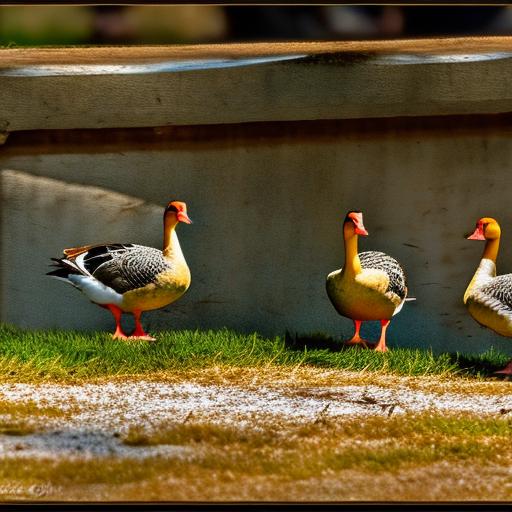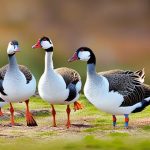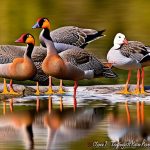Geese are a common sight in many neighborhoods, parks, and open spaces. These large waterfowl are known for their distinctive honking calls and graceful flight patterns. While geese can be a beautiful addition to the natural landscape, they can also become a nuisance when they invade your yard. Understanding geese behavior and knowing how to keep them out of your yard is essential for maintaining a peaceful and clean outdoor space.
Geese are attracted to yards for several reasons. One of the main attractions is food. Geese are herbivores and feed on grass, plants, and grains. If your yard has an abundance of these food sources, it is likely to attract geese. Additionally, geese are attracted to bodies of water such as ponds or lakes, as they provide a safe place for them to swim and rest. If your yard has a water feature, it may be particularly appealing to geese.
Key Takeaways
- Geese can be a common sight in yards and parks, but they can cause damage and health hazards.
- Geese are attracted to yards with easy access to food, water, and shelter.
- Understanding geese behavior can help in implementing effective control measures.
- Physical barriers, scare tactics, repellents, and landscaping techniques can all be used to keep geese out of yards.
- Proper waste management and creating a goose-free zone are important for long-term geese control.
Reasons to Keep Geese Out of Your Yard
While geese may seem harmless, there are several reasons why you may want to keep them out of your yard. One of the main concerns is the damage they can cause to property and landscaping. Geese have a voracious appetite and can quickly strip grass and plants down to the roots. This can leave your yard looking unsightly and can be costly to repair.
Another concern is the health risks associated with goose droppings. Goose droppings can contain harmful bacteria such as E.coli and Salmonella, which can pose a risk to humans and pets if ingested or inhaled. Additionally, goose droppings can create slippery surfaces, increasing the risk of falls and injuries.
Noise and aggression are also common issues with geese. Geese are known for their loud honking calls, which can be disruptive and annoying, especially if you have neighbors in close proximity. Geese can also become aggressive, especially during nesting season, and may hiss, bite, or chase after humans or other animals that they perceive as a threat.
Understanding Geese Behavior
To effectively keep geese out of your yard, it is important to understand their behavior. Geese have specific mating and nesting habits that can influence their presence in your yard. During mating season, which typically occurs in the spring, geese will establish nesting sites near bodies of water. They are protective of their nests and can become aggressive if they feel threatened.
Geese also have specific feeding patterns. They prefer to feed on grass and plants that are close to water sources, as this provides them with easy access to both food and safety. Understanding their feeding patterns can help you identify areas in your yard that may be particularly attractive to geese.
In addition to mating and feeding habits, geese also have flight patterns that can be useful in deterring them from your yard. Geese typically fly in a V-formation, with one bird leading the way and the others following closely behind. By understanding their flight patterns, you can strategically place deterrents or barriers to discourage geese from landing in your yard.
Physical Barriers to Keep Geese Out
One of the most effective ways to keep geese out of your yard is by installing physical barriers. Fencing options such as chain-link or electric fences can be effective in keeping geese out. Make sure the fence is at least three feet high and extends underground to prevent geese from digging under it.
Netting and mesh barriers can also be effective in keeping geese away. These barriers can be installed over ponds or other water features to prevent geese from accessing them. Make sure the netting or mesh is securely fastened and does not have any gaps that geese can squeeze through.
Planting hedges or shrubs around your yard can also act as a physical barrier to keep geese out. Geese prefer open spaces where they have a clear line of sight, so planting dense vegetation can make your yard less appealing to them. Choose plants that are unpalatable to geese, such as holly or juniper, and make sure to maintain them regularly to ensure they remain effective as a barrier.
Scare Tactics to Deter Geese
In addition to physical barriers, scare tactics can also be effective in deterring geese from your yard. Visual deterrents such as decoys or flags can be used to create the illusion of a predator presence. Place decoys such as plastic owls or coyotes in your yard, or hang reflective flags or streamers to create movement and scare geese away.
Auditory deterrents can also be effective in deterring geese. Noise makers such as air horns or whistles can startle geese and make them uncomfortable. Predator calls, such as recordings of bird distress calls or barking dogs, can also be effective in scaring geese away.
Motion-activated sprinklers or lights can also be used as scare tactics. These devices are triggered by motion and can startle geese when they enter your yard. Make sure to place them strategically in areas where geese are likely to land or feed.
Repellents to Keep Geese Away

There are several repellents available that can help keep geese away from your yard. Chemical repellents such as Methyl Anthranilate (MA) can be sprayed on grass and plants to make them taste unpleasant to geese. These repellents are safe for humans and pets but should be used according to the manufacturer’s instructions.
Natural repellents such as garlic or peppermint oil can also be effective in deterring geese. These repellents can be sprayed on grass or plants, or soaked into cotton balls and placed strategically around your yard. The strong smell of these repellents can make your yard unappealing to geese.
Ultrasonic devices emit high-frequency sounds that are unpleasant to geese but are not audible to humans. These devices can be placed in your yard and can help deter geese from landing or feeding. Make sure to follow the manufacturer’s instructions for proper placement and usage.
Landscaping Techniques to Discourage Geese
In addition to physical barriers and repellents, there are several landscaping techniques that can help discourage geese from your yard. Removing food sources such as fallen fruit or spilled birdseed can make your yard less attractive to geese. Regularly clean up any food or garbage that may be left out in your yard.
Planting unappealing vegetation can also help deter geese. Geese prefer grass and plants that are close to water sources, so planting tall grasses or shrubs away from water can make your yard less appealing to them. Choose plants that are unpalatable to geese, such as yarrow or lavender.
Creating a water feature that discourages geese can also be effective. Geese prefer open bodies of water where they have easy access to both food and safety. Adding floating islands or vegetation to your pond or installing a fountain or aerator can make it less appealing to geese.
Proper Waste Management to Reduce Attraction for Geese
Proper waste management is essential in reducing the attraction for geese in your yard. Promptly clean up any spilled food or garbage, as these can attract geese looking for an easy meal. Make sure to properly dispose of pet waste, as this can also be a food source for geese.
Regularly clean gutters and downspouts to prevent standing water, as this can attract geese looking for a place to swim or rest. Make sure your yard is free of standing water and remove any debris that may collect water.
Creating a Goose-Free Zone
If you want to create a goose-free zone in your yard, there are several steps you can take. Designate a specific area where geese are not allowed, such as a patio or deck. Install physical barriers or deterrents around the zone to prevent geese from entering. Consistently enforce the rules and make sure everyone in your household is aware of the designated goose-free zone.
Conclusion and Tips for Long-Term Geese Control
In conclusion, keeping geese out of your yard requires a combination of strategies and consistent effort. Understanding geese behavior and implementing physical barriers, scare tactics, repellents, and landscaping techniques can help deter geese from your yard. Proper waste management and creating a designated goose-free zone can also be effective in reducing the attraction for geese.
It is important to remember that geese are protected by federal law, so it is illegal to harm or kill them without proper permits. If you are unable to effectively control geese on your own, consider working with your neighbors to implement a neighborhood-wide geese control plan. If all else fails, seek professional help from wildlife control experts who can provide additional guidance and assistance in managing geese in your yard. With persistence and consistent effort, you can create a peaceful and goose-free outdoor space for you and your family to enjoy.
If you’re looking for effective ways to keep geese out of your yard, you might also be interested in learning about the benefits of having a chicken coop with a trampoline. Yes, you read that right! This unique article from Poultry Wizard explores the concept of combining a chicken coop with a trampoline to create a fun and functional space for your feathered friends. Not only does it provide entertainment for the chickens, but it also helps to keep them active and healthy. To read more about this innovative idea, check out the article here.
FAQs
What are some effective ways to keep geese out of my yard?
There are several effective ways to keep geese out of your yard, including installing physical barriers such as fences or netting, using decoys or scare tactics, and modifying the landscape to make it less attractive to geese.
What are some natural deterrents for geese?
Some natural deterrents for geese include planting tall grasses or shrubs, using motion-activated sprinklers, and introducing natural predators such as dogs or hawks.
Why are geese attracted to my yard?
Geese are attracted to yards that provide easy access to food, water, and shelter. They are also attracted to open spaces with good visibility, which allows them to keep an eye out for predators.
Are there any legal restrictions on keeping geese out of my yard?
There are no legal restrictions on keeping geese out of your yard, as long as you do not harm the geese or violate any animal welfare laws.
What should I do if I encounter a problem with geese in my yard?
If you encounter a problem with geese in your yard, you should first try to identify the source of the problem and take steps to eliminate it. If the problem persists, you may need to seek professional help from a wildlife control expert or local animal control agency.
Meet Walter, the feathered-friend fanatic of Florida! Nestled in the sunshine state, Walter struts through life with his feathered companions, clucking his way to happiness. With a coop that’s fancier than a five-star hotel, he’s the Don Juan of the chicken world. When he’s not teaching his hens to do the cha-cha, you’ll find him in a heated debate with his prized rooster, Sir Clucks-a-Lot. Walter’s poultry passion is no yolk; he’s the sunny-side-up guy you never knew you needed in your flock of friends!







